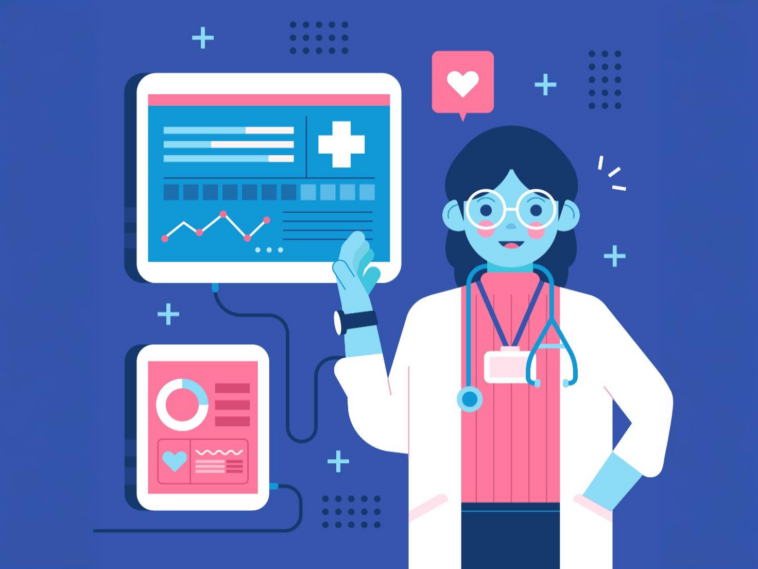AI and Automation in Healthcare Billing: Streamlining Processes and Reducing Errors
The healthcare industry is complex, with numerous stakeholders involved in the delivery and reimbursement of medical services. One of the most critical areas where efficiency can significantly impact financial performance is healthcare billing. Traditionally, healthcare billing has been a process prone to errors, delays, and inefficiencies. However, the rise of AI in medical billing and healthcare billing automation is reshaping this aspect of the healthcare industry, providing solutions that streamline billing processes, improve accuracy, and reduce errors.
In this blog, we will explore how Automation in Healthcare, particularly in the context of billing, is benefiting healthcare organizations. We will also discuss how Healthcare Automation Software, Medical AI Chatbots, and Hospital Management System is playing crucial roles in improving the billing process, optimizing healthcare financial systems, and reducing billing errors.
The Challenges in Traditional Healthcare Billing
Before diving into how AI and automation are transforming the billing process, it’s important to understand the challenges that exist in traditional healthcare billing systems. The complexities of billing processes, along with the administrative workload, contribute to inefficiencies and errors.
Common Challenges in Healthcare Billing
-
Complex Billing Codes: Healthcare billing requires the use of complex coding systems, such as ICD-10 for diagnoses and CPT for procedures. These codes must be accurately applied, and errors can lead to claim denials, delays in payment, and even penalties for non-compliance.
-
Manual Data Entry: In traditional billing systems, data entry is often done manually, leading to human errors, data inconsistencies, and administrative inefficiencies. Misgendered patient information, incorrect coding, or missing details can result in delayed reimbursements or claim rejections.
-
Lack of Real-Time Updates: Healthcare providers often struggle with outdated information regarding insurance coverage or patient billing details, leading to discrepancies in bills. Without real-time updates, healthcare organizations find it difficult to manage claims efficiently and accurately.
-
Claim Denials: Claim denials are common in healthcare billing, with studies showing that about one in five claims are denied by insurance providers. A significant portion of these denials is due to billing errors, incorrect coding, and missing documentation.
How Healthcare Automation Software is Improving Healthcare Billing
Healthcare Automation Software has revolutionized the way billing processes are handled in healthcare settings. By automating key tasks, such as coding, claims submission, and payment reconciliation, automation minimizes the risk of human errors and improves the efficiency of the billing workflow.
1. Automated Medical Coding
Medical coding is one of the most time-consuming and error-prone tasks in healthcare billing. Healthcare Automation Software leverages AI and machine learning algorithms to automatically generate medical codes based on patient data, eliminating the need for manual entry and reducing errors.
- AI-Powered Coding: AI-powered systems can analyze clinical notes, diagnostic information, and procedure details to assign the correct codes. This improves accuracy and ensures that the right codes are applied to claims.
- Real-Time Validation: Automated systems can validate codes in real time, ensuring that they comply with industry standards and insurance requirements before claims are submitted.
By automating the coding process, healthcare organizations can significantly reduce the number of claim denials and ensure faster reimbursements.
2. Automated Claims Submission
Once the coding is complete, Healthcare Automation Software can automatically submit claims to insurance providers and government payers. This eliminates the need for manual submission and reduces the risk of human errors that can result in denied claims.
- Claims Tracking: Automated systems track the progress of each claim and provide real-time updates, allowing healthcare providers to quickly address any issues or denials.
- Faster Reimbursements: Automated claim submissions reduce the time it takes for insurance providers to process claims, accelerating the reimbursement cycle and improving cash flow for healthcare organizations.
3. Payment Reconciliation and Error Reduction
Automated systems also improve the accuracy of payment reconciliation by cross-referencing payments with submitted claims. This reduces discrepancies between the amounts billed and the amounts paid, ensuring that healthcare organizations receive the correct reimbursements.
- Automated Matching: Automation software can automatically match payments to the corresponding claims, reducing the need for manual reconciliation and ensuring accurate records.
- Discrepancy Alerts: When discrepancies are detected between claims and payments, automated systems can alert billing professionals to address the issue, reducing the risk of underpayments or overpayments.
By automating the reconciliation process, healthcare organizations can prevent financial errors and ensure more accurate billing.
The Role of AI in Medical Billing
AI in healthcare is transforming many aspects of patient care and hospital administration, including billing. Medical AI Chatbot and other AI-driven tools are being used to improve billing accuracy, reduce administrative overhead, and enhance communication with patients.
1. Reducing Billing Errors with AI
AI tools in healthcare billing can significantly reduce errors by automating tasks and providing real-time decision support for billing professionals.
- AI-Powered Error Detection: AI can automatically flag potential errors in claims before submission, such as incorrect codes, missing information, or discrepancies in patient details.
- Predictive Analytics for Denial Prevention: AI systems can analyze historical billing data to predict common reasons for claim denials and suggest corrective actions before claims are submitted.
Conclusion
Healthcare billing automation powered by AI and Healthcare Automation Software is transforming the healthcare industry, reducing errors, speeding up reimbursements, and improving overall financial management. By integrating AI-driven tools, such as Medical AI Chatbots, and incorporating them into Hospital Management Systems, healthcare organizations can streamline their billing processes, improve accuracy, and enhance patient satisfaction. As these technologies continue to evolve, the future of healthcare billing looks more efficient, accurate, and patient-friendly.
This post was created with our nice and easy submission form. Create your post!





